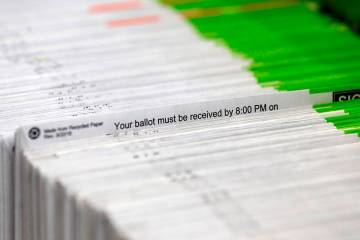EDITORIAL: In solar and elsewhere, state shouldn’t subsidize private enterprise
There's been no shortage of back-and-forth arguing since the December decision by Nevada's Public Utilities Commission to approve a new rate structure for residential rooftop solar customers. One of the latest concerns is that the state might have to consider shifting some of its economic development focus away from the solar industry.
To which we ask: Might?
As reported last month by the Review-Journal's Sean Whaley, Nevada government and business leaders indicated such a shift may become necessary if new net metering rules drive the rooftop solar industry out of Nevada, as predicted by industry officials. The answer here seems obvious: If the rooftop solar industry isn't here, or even if it is here but is scaling back, then of course the state needs to stop shoveling funds to the industry.
That speaks to the issue at the heart of the rooftop solar industry: it's been long propped up by tax credits and subsidies. The only reason rooftop solar was viable, for both the companies that installed it and the consumers who purchased it, was because of political interventions. Solar panels, be they for homeowners or businesses, could be installed at little to no cost, and those rooftop solar owners were then overcompensated for the surplus power they generated, allowing them to realize a reduction in their power bills at the expense of those who did not invest in solar panels.
Indeed, NV Energy was paying rooftop solar power generators 11.5 cents per kilowatt hour for excess energy, more than twice as much as the utility company paid for energy on the open market (4.4 cents per kWh). As we've noted previously, the entire arrangement — a web of federal tax breaks, state utility regulation, private-party leases and politically correct, environmental coercion — was always at risk of collapsing with a single unfavorable change in policy.
Mr. Whaley noted that Gov. Brian Sandoval's Office of Energy implemented a rooftop solar initiative in 2012, and among the initiative's goals was seeking to make solar electricity cost-competitive with other forms of energy. And how did the office aim to reach that goal? Recently, it announced that $467 million in state incentives, grants and loans have been provided to develop the solar industry in Nevada. SolarCity, one of the more prominent installers, received $1.2 million from the Governor's Office of Economic Development, then eliminated 550 jobs after the rate structure changed.
Nevada is well into the race to provide businesses with incentives, chasing and being chased by other states eager to do the same. But the state would better serve its citizens by getting out of economic development altogether and halting the subsidization of private enterprises that will compete against companies that aren't subsidized.




























